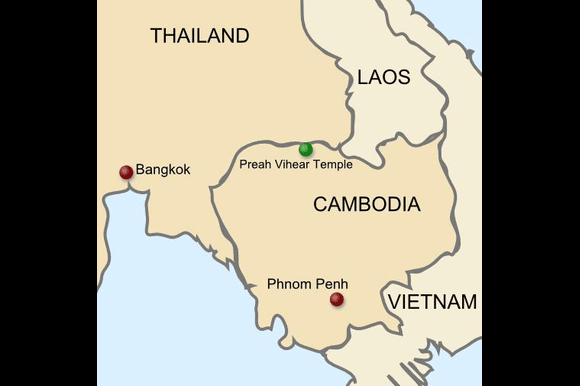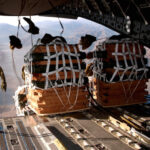Thailand’s acting Prime Minister, Phumtham Wechayachai, has issued a stark warning that ongoing border clashes with Cambodia—already responsible for the deaths of at least 16 people and the displacement of tens of thousands—risk spiraling into a full-scale war.
Phumtham revealed that the conflict has intensified, with fighting spreading to 12 separate locations along the Thailand-Cambodia border and now involving the use of heavy weaponry. Thai authorities have evacuated all villages deemed vulnerable to Cambodian rocket attacks, accusing Cambodian forces of targeting civilian areas.
Cambodia, meanwhile, has levelled serious allegations against Thailand, accusing its military of deploying cluster munitions—controversial weapons banned under international law due to their indiscriminate impact on civilian populations. Thailand has not publicly responded to these accusations.
Amid mounting global concern, Thailand’s foreign minister insisted that third-party mediation was unnecessary, despite international offers to step in. Speaking to Reuters, he emphasized that the matter should be resolved bilaterally and called on Cambodia to halt its “offensive moves.”
“There is no need for outside mediation at this stage,” said Thai Foreign Ministry spokesman Nikorndej Balankura.
The call for restraint came as both countries updated casualty figures from the ongoing hostilities. Thai authorities confirmed 14 civilian deaths along with one soldier killed, while Cambodian officials reported at least one civilian fatality in Oddar Meanchey province.
In the face of rising civilian tolls and regional destabilization, global leaders have urged both nations to de-escalate immediately. The United States issued a strong statement calling for “an immediate cessation of hostilities, protection of civilians, and a peaceful resolution of the conflict.” State Department spokesman Tommy Pigott expressed grave concern over the situation and sorrow for the reported civilian casualties.
China, a key strategic partner to both Thailand and Cambodia, stated it was “deeply concerned” by the fighting and urged both sides to resolve the issue through “dialogue and consultation.” Australia, France, and the European Union joined the chorus of voices urging peace and de-escalation.
Meanwhile, Malaysia’s Prime Minister Anwar Ibrahim, current chair of the Association of Southeast Asian Nations (ASEAN), offered to mediate between Bangkok and Phnom Penh. Anwar expressed cautious optimism after both governments appeared open to discussions, posting on Facebook: “I welcome the positive signals and willingness shown by both Bangkok and Phnom Penh to consider this path forward.”
However, Thailand remains firm on keeping negotiations bilateral. Nikorndej reiterated that any talks must begin with Cambodia ceasing its military actions.
The conflict is set to be discussed at an emergency session of the United Nations Security Council on Friday. In a formal letter to the council, Cambodian Prime Minister Hun Manet requested urgent intervention to “stop Thailand’s aggression.”
Both nations continue to accuse each other of instigating the recent escalation. Thailand claims the confrontation began when Cambodian forces deployed surveillance drones near its troops. Cambodia asserts that the Thai army violated a longstanding agreement by advancing toward a disputed Khmer-Hindu temple near the border.
The underlying tensions stem from a century-old territorial dispute that traces back to border demarcations made during the French colonial era in Cambodia. Skirmishes have erupted sporadically over the decades, with both soldiers and civilians killed in previous confrontations.
The most recent flare-up began in May after a Cambodian soldier was killed, plunging bilateral relations to their lowest point in more than ten years.
In Thailand’s Surin province, a sports complex has been converted into an evacuation centre housing thousands of displaced civilians. Many evacuees, including children and the elderly, remain traumatized by the rocket and artillery attacks that rocked their villages.
Some elderly evacuees, who survived the brutal civil war in Cambodia during the 1980s, told the BBC that the current violence is the worst they have experienced.
Joi Phasuwan, a resident of Phanom Dong Rak district, described how she and her two grandchildren endured a long wait before finally being relocated. “This time, we had to move farther than ever before,” she said.
Elsewhere, in a small village about 10km (6.2 miles) from the border, a handful of elderly men stayed behind to guard their homes and livestock after women and children were evacuated. Around them, houses stood abandoned, and the only sign of life came from the boom of artillery echoing through the empty landscape.
The men sheltered near an improvised bunker made from concrete pipe sections reinforced with sandbags and tires, built the previous month in anticipation of conflict. Nearby, Thai soldiers had set up a temporary base at a school, although they refused to be filmed or to have the location identified.
Across the region, roads remained largely deserted, apart from occasional military convoys. Village after village stood empty as the conflict brought normal life to a standstill.
The root of this deadly escalation lies in a longstanding territorial dispute over ancient temples and narrow strips of forestland—places of seemingly minor geopolitical value but now at the heart of a crisis threatening to plunge two nations into war.






